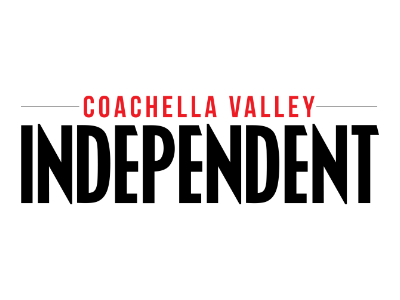
In his debut book of poems, Coachella Elegy, Christian Gullette delivers a collection that pays tribute to “the queer promised lands and poolside utopias of the American West.”
From Palm Springs to Santa Cruz and Sonoma, Gullette describes the state of California in grand and glaring contradictions. West Coast landmarks are tangible subjects, with memories and meaning attached to their boundaries. The verses meander and curve, like a warm wind on an open highway—but they are going places you will not find on a map.
Coachella Elegy (Trio House Press) has been described as intimate, erotic, foreboding, elegant and even sly. Gullette chooses language that is striking in its spareness, with the works rendered in trim, tightly wound observations. The poems are small bites, supremely digestible, but densely populated.
A slim volume, not quite 80 pages, Coachella Elegy is filled with emotionally potent content. There’s a love story at its core, with inspiration coming from Gullette’s own lived experiences.
“Beyond the fact that obviously it is a celebration of Coachella and Palm Springs, also at the heart of the book, my husband is a cancer survivor,” Gullette told the Independent. “So a lot of the book is a love story about that, and about the role that Palm Springs played in being this hope, and myth of the American West, as (a) place where people can come to find these queer paradises and oases. But that’s not always how it works out.”
Themes of love and loss co-mingle as lines traverse the state, sweeping north and returning to the desert. In the opening poem, a speaker observes: Palm Springs rewinds things.
The line invokes irony. Gullette describes the setting and inspiration: “The speakers are celebrating an anniversary and having survived cancer. The irony is that they’ve gone antiquing, and so you never escape the things from the past. In a sense, they’re always there, but also, we’re always in search of new places to both feel alive and reinvent ourselves, and our spaces, (and) what it means to live and be alive. I think that’s the complicated search at the heart.”
The book’s title reflects that duality, said Gullette. “All the pleasure and fun and joy and abandonment that people associate with Coachella, like the music festival and Palm Springs as this sort of oasis getaway for pleasure and fun, in juxtaposing that with a word like elegy, that brings in a sense of pain and melancholy and loss and grief. And it’s that tension that informs the whole collection. Essentially, when there’s pleasure, there’s pain.”
The speaker leads us on a journey of discovery. “The arc of the collection is, there’s always duality in life,” Gullette said. “The speaker comes to realize that no matter where you go or wander in life, things like grief and loss still accompany you. In some of the poems, that’s the echoes of AIDS, you know, in places like San Francisco, in Palm Springs and in other parts of California. It can be the environmental loss of bees and butterflies and things destroyed by fire. But the main loss that the speaker kind of carries with him is the loss of his brother.”

Gullette wrote six different elegies devoted to his late brother Jeremy. They punctuate the collection and the journey as echoes. “As if there were things echoing in the canyon or echoing in the valley, between the mountains in the desert,” he said. “I had the idea for that when I wrote one of the very first poems of this collection, which was called “Coachella Elegy.”
Politics also finds space in Elegy. “Election Night” throws back to 2016:
On the dance floor,
my fingertip traces his infinity tattoo
and I wish more things were uncountable,
although cruelty is also endless.
Gullette said his poems are not overtly political—but Elegy can’t exist in a vacuum. The book even opens with a mention of laws against gay marriage.
“‘Election Night’ (depicts) 2016 when Trump won,” Gullette said. “We went to a famous gay bar in San Francisco to just find community in the grief of it. And here’s this amazing drag queen performing “Let the Sunshine In,” but everyone’s bawling their eyes out. It’s this intense song that’s supposed to be about celebrating and the dawning of a new age.”
Gullette was on hand at Greater Palm Springs Pride in November signing copies. He has several online readings from Elegy coming up this winter. He hopes poetry lovers will find themes that pique their interest.
“People can come at it from a couple of different angles,” he said. “There are a lot of very celebratory poems about joy and pleasure and pools and all the things that I adore about Palm Springs, for instance.
“I think the book is both a story and a celebration of what it means as queer people to be living in this moment, for my husband to have survived cancer, and for us to be finding the beauty and pleasure and joy in life—and celebrating that, especially in a place like Palm Springs, and San Francisco, both of which have these historical associations as places people can go to start new lives and/or make the most of their life, or find freedom and joy. The collection definitely focuses on that, and the relationship between those two figures in the movement West, and what it means to live in the West.”
Gullette’s work is also included in Invisible Strings, an anthology of brand-new poems inspired by Taylor Swift songs, released in December.
Best Bookstore in Palm Springs has Coachella Elegy in stock; it can also be purchased via the usual online booksellers. Learn more at www.christiangullette.com.
Pleasure and Pain: Palm Springs Plays a Big Part in Christian Gullette’s Debut Poetry Collection, ‘Coachella Elegy’ is a story from Coachella Valley Independent, the Coachella Valley’s alternative news source.

